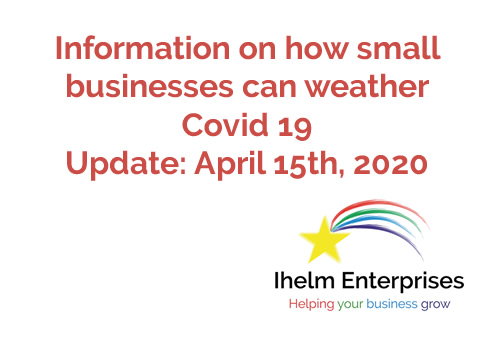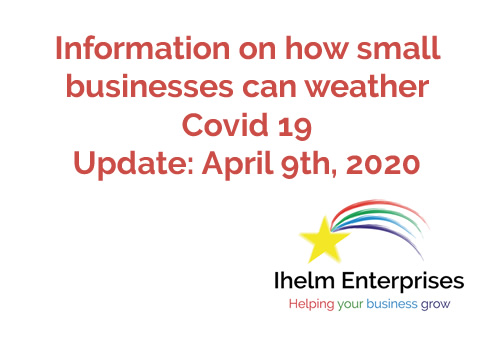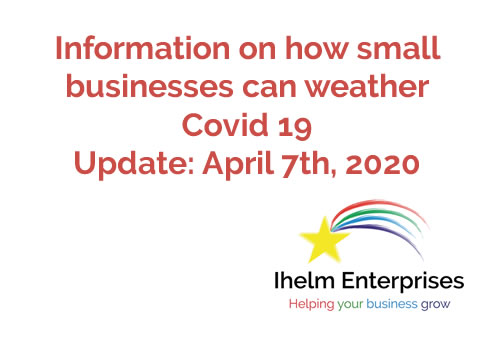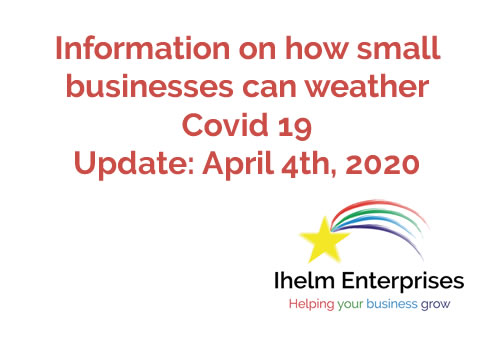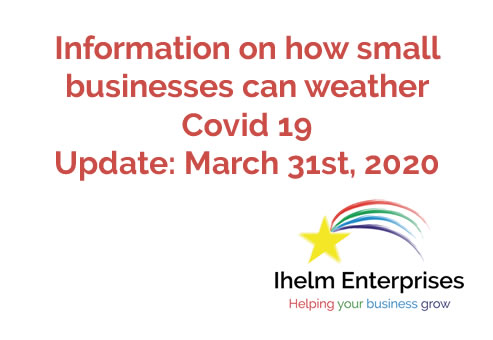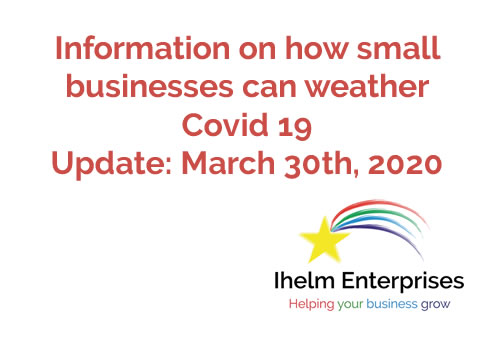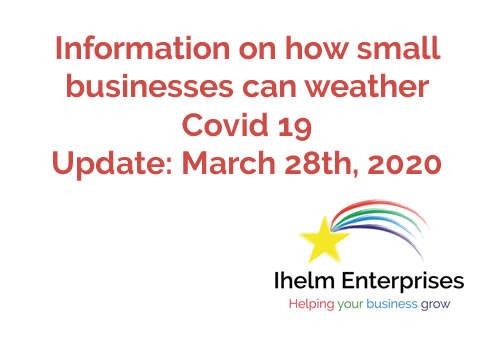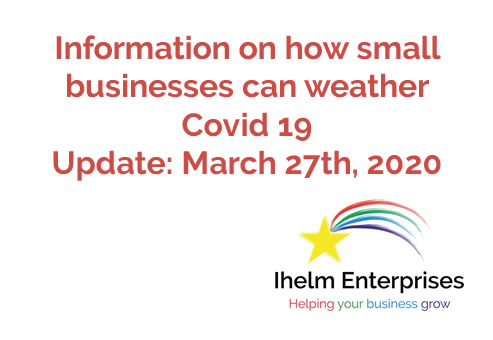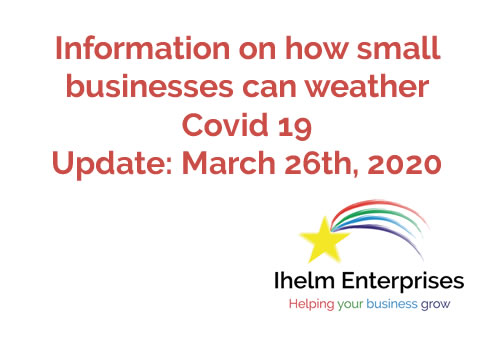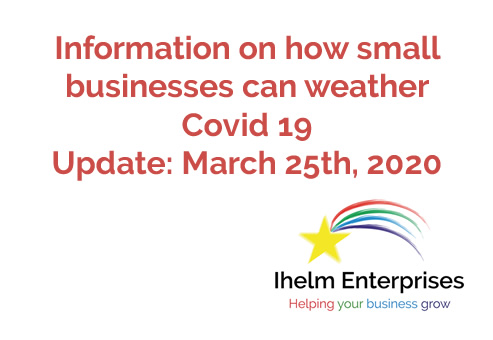We haven’t had any really big announcements in the last few days – but I am keeping a close eye on the news briefings and the information that is being released, and I will keep doing updates as and when new or updated information becomes available
1) Statutory Sick Pay
Further guidance has been made available about how employers can claim back Statutory Sick Pay (SSP) paid to employees due to Covid-19. The online system for claiming back the SSP isn’t available just yet, but HMRC will announce once it is. This scheme is only for current or former employees who had periods of sickness starting on or after 13/03/2020 and employers will be able to claim back the current rate of SSP. It will cover up to 2 weeks starting from the first day of sickness if an employee is unable to work because they either have coronavirus or cannot work due to having to self-isolate at home.
Employers can only access the scheme if they are claiming for an employee who is eligible for SSP due to coronavirus, had a PAYE payroll scheme that was created and started on or before 28/02/2020 and had fewer than 250 employers on 28/02/2020. It covers all employment contracts including full-time employees, part-time employees, employees on agency contracts and employees on flexible or zero-hour contracts. There is currently no end-date for this scheme but HMRC will announce when it will end.
Charities and companies that are connected can also access this scheme if their total combined number of PAYE employees were fewer than 250 on or before 28/02/2020.
In order to claim back the SSP, you will need to keep specific records for at least 3 years following your claim which includes:
– why the employee could not work
– details of each period when an employee could not work (including start and end dates)
– details of the SSP qualifying days when an employee could not work
– NI numbers of all employees who you have paid SSP to
2) Job Retention Scheme
The online system for submitting information about your furloughed employees should be available by the end of April 2020.
The grant will cover 80% of the usual monthly wage for a furloughed employee, up to £2,500/month, plus the associated Employer National Insurance contributions and the minimum automatic enrolment employer pension contributions on that wage
In order for employers to claim, they must have created and started a PAYE payroll scheme on or before 28/02/2020, enrolled for PAYE online (this can take up to 10 days) and a UK bank account. Any entity with a UK payroll can apply for this scheme (businesses, charities, recruitment agencies and public authorities).
There is a lot of information contained within the document on the government website: https://www.gov.uk/guidance/claim-for-wage-costs-through-the-coronavirus-job-retention-scheme and some of it is pretty comprehensive so I won’t be going through every individual bit in the blog post. I will be touching on some of the most important bits though. One of those things is the question about the rules for directors of companies and how this scheme works for them. They have also made it very clear about what you can and cannot ask employees to do while they are furloughed and what their rights are.
Further information has now been released in regards to eligible individuals who are not employees (so directors of companies). If the director has been paid via PAYE and they are office holders, salaried members of a Limited Liability Partnership (LLPs), agency workers (including those employed by umbrella companies) and limb (b) workers. There are very specific considerations for these types of situations where the individual is paid via PAYE but is not necessarily an employee in regards to Employment Law. Unless explicitly set out in the scheme, all other guidance is applicable to these cases and should be followed.
Office Holders: they can be furloughed and receive support through this scheme. The payment will need to be agreed between the office holder and the party who operates PAYE on the income they receive for holding their office. If the office holder is a company director or member of an LLP, the furlough arrangements should be adopted formally as a decision of the company or LLP.
Company Directors: salaried company directors are eligible to be furloughed through this scheme. During the time period the director is furloughed, they can carry out their statutory duties to the company as outlined in the Companies Act 2006, but they cannot do more than would reasonably be judged necessary for that purpose (ie they should not carry out work they would carry out in normal circumstances to generate commerce revenue or provide services to or on behalf of their company). This also applies to individuals who are directors of their own personal service company (PSC). Basically, a company director can be furloughed but they cannot do anything for the business that would be seen as generating any income for it – no promotion of the business, cannot provide service to customers, cannot respond to e-mails or issue invoices to customers, they can only do the jobs that are their legal statutory duties for the position they hold in their company (filing accounts with Companies House, filing the corporation tax return).
3) Business Interruption Loans
Yesterday, the Chancellor announced changes to the Coronavirus Business Interruption Loan scheme so that more businesses are able to access this support. Various banks and lenders have been putting their own roadblocks up to restrict what sort of products a business is able to access – and this has caused a lot of problems for small businesses who have tried to access support to help with short-term cashflow issues while they wait for the government schemes to start working. This scheme has now been expanded to include all viable small businesses affected by Covid-19, and not just those who are unable to secure regular commercial financing. The government has also announced that lenders are not allowed to request personal guarantees for loans under £250,000. The government has also said ” For loans over £250,000, personal guarantees will be limited to just 20% of any amount outstanding on the CBILS lending after any other recoveries from business assets. Lenders were already prohibited from asking business owners to put their house on the line, but today’s changes will provide further reassurance regarding personal assets during this difficult time.” All of the new changes will apply to finance already offered under the scheme.
The Chancellor also announced an additional scheme for large businesses who have a turnover of between £45 million and £500 million. They will provide a government guarantee of 80% to enable banks to make loans of up to £25 million. All loans backed by a guarantee under Coronavirus Large Business Interruption Loan Scheme (CLBILS) will be offered at commercial rates of interest and further details will be released later this month.
More providers of the CBILS are continuing to be accredited and added to the scheme to aid businesses in being able to access it.
The information and policies are continually being updated by the government, so I urge you to keep on top of the information by visiting the relevant website for your area.
UK: https://www.gov.uk/government/publications/guidance-to-employers-and-businesses-about-covid-19/covid-19-support-for-businesses
Scotland: https://www.gov.scot/coronavirus-covid-19/
Wales: https://gov.wales/business-and-employers-coronavirus
Northern Ireland: https://www.nibusinessinfo.co.uk/
I will be trying to keep myself as informed as possible and will share relevant information on my fb business page: https://www.facebook.com/ihelmenterprises/

